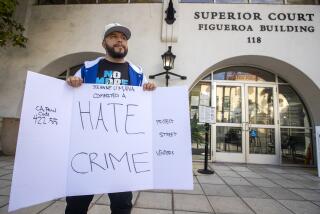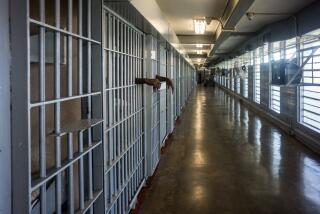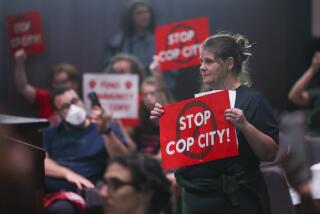Protesters march to support ‘Jena Six’
In a scene reminiscent of civil rights protests of decades past, thousands of protesters descended on this small Southern town Thursday to peacefully decry what they said was the unfair treatment of six black teenagers charged with beating a white schoolmate.
The case of the Jena Six, as the defendants have come to be known, attracted a cast of famous black leaders, but many said the crowd was called by fresh chorus of voices -- among them bloggers, black radio personalities and Web-networked college students.
Organizers said the crowd swelled to 50,000; state police said it was too spread out to count. As the visitors began pouring into this mostly white central Louisiana community of 3,000 at daybreak, they encountered a ghost town: The courthouse, the high school and almost all the businesses -- from the barber to the bail bondsman -- were closed.
It was not long, though, before the protesters, many of them African American and many wearing black T-shirts, filled the two-lane highway through downtown and residential streets, chanting and holding placards that read “Free the Jena Six” and “Enough Is Enough.”
On the steps of the LaSalle Parish Courthouse, speakers described the case as an example of an American justice system that continued to treat African Americans unfairly, despite the progress made since the days of Jim Crow.
“In the 20th century, we had to fight for where we sit on the bus,” said the Rev. Al Sharpton, who arrived at the courthouse with members of the defendants’ families. “Now we have to fight on how we sit in the courtroom.”
Added the Rev. Jesse Jackson: “There is a Jena in every town, a Jena in every state.”
That kind of talk was met with disdain by residents of Jena (pronounced JEE-nuh), many of whom stayed indoors for the day. Some who ventured outside said their town had been unfairly singled out, by both protesters and media, as a backwoods redoubt of racial animosity.
“They have cast us a bunch of ignorant, racist bumpkins,” said Ray Hodges, an automotive technology teacher at Jena High School. “It’s about as far from the truth as you can get. There is racism in Jena, but it’s not only in Jena, it’s not only in Louisiana, it’s not only in the South. It’s an American thing.”
“I actually heard a girl shout ‘Shame on Jena,’ ” said Pam Sharp, 43, who sat in a plastic chair as the procession filed past her house. “I shouted back, ‘No, shame on you!’ ” How can they include the whole town? That’s the shame.”
For Sharp, the victim in the case was Justin Barker, the 17-year-old white student who was kicked in the head and knocked unconscious.
“Protesters don’t want to talk about him,” she said.
At a White House news conference Thursday morning, President Bush said the events in Jena had “saddened” him.
“I understand the emotions,” Bush said. “The Justice Department and the FBI are monitoring the situation down there, and all of us in America want there to be fairness when it comes to justice.”
Sharpton told the Associated Press that he and other black leaders were trying to persuade the House Judiciary Committee to call Jena’s district attorney, Reed Walters, to Capitol Hill to explain his actions.
Walters, in a news conference Wednesday, said the case was not about race but about “finding justice for an innocent victim, and holding people accountable for their actions.”
To some black observers, however, the Jena story -- studded with explosive symbols from an age of more widespread and blatant racism -- was too volatile to be ignored.
The trouble started last September when three white students hung nooses from a tree where whites traditionally congregated at the local high school. The students responsible were suspended. Later, part of the school mysteriously burned down.
Racial tensions reportedly flared on campus, and in December, the six black students allegedly beat up Barker. He was taken to the hospital and treated for injuries to his ears, face and eye; later that night, he attended a ring ceremony at school.
The black students were arrested and kicked out of school, and five of them were charged with attempted second-degree murder. (The sixth was charged as a juvenile and was recently allowed to return to classes.) The charges were later reduced. One of the defendants, Mychal Bell, was tried and found guilty of aggravated battery. His conviction was thrown out this month, though, because he was tried as an adult rather than a juvenile. He remains in custody while prosecutors decided whether to file new charges against him.
The other defendants are awaiting trial dates and face up to 22 years in prison.
To Jasmyne Cannick -- a blogger and black activist from Los Angeles -- such details convinced her that something was clearly amiss in Jena. In recent days, she said, she has devoted much of her blogging to the case, and encouraged supporters to go to Thursday’s protest or wear black in their hometowns.
Cannick and other bloggers linked to an online petition that had more than 380,000 signatures by Thursday afternoon. Addressed to the U.S. Justice Department’s civil rights division, the petition called the treatment of the young men a “gross miscarriage of justice” and demanded a federal investigation. Some of the signatories left searing comments.
“This case is so racist, it’s not even funny,” wrote Omonike Ayorinde of Illinois. “As a black woman, a noose hanging from a tree is NOT just some ‘silly little prank.’ My heart and prayers are with these boys and their families.”
Members of the social networking website Facebook formed “Free the Jena 6” groups. On the video site YouTube, users posted snippets of news broadcasts and footage from local rallies in support of the defendants. Some delivered homemade protest raps.
“Jena Six Louisiana, it’s so clear -- racism still alive and kickin’ down there,” rhymed a man who called himself ConsciousL.
In the radio industry, Thursday’s protest was seen as a sign of the growing influence of black talk show hosts. Their popularity has been growing in recent years in concert with the general rise of the talk radio phenomenon, according to Michael Harrison, publisher of Talkers, an industry magazine.
That power has been evident in Atlanta, where radio station WAMJ-FM (102.5) delivers hours of black-oriented talk radio programming. Derek Harper, the station’s program director, said that in the last month, most of the station’s syndicated talkers -- including Steve Harvey, Al Sharpton, Michael Baisden and Warren Ballentine -- had picked up on the story and made it a major issue.
Ballentine was among a number of radio personalities broadcasting live from Jena on Thursday. He said he had been rallying black people around the issue since learning about it in June.
On his show, he recalled, “I said, ‘I’m calling out attorneys, ballplayers, rappers -- you got to step to the plate! . . . Where are you at when our kids need you?’ ”
That sense of urgency and outrage is not shared by all African Americans, however.
Joe Hicks, the former head of the Southern Christian Leadership Conference’s Los Angeles chapter, accused some black leaders of rushing to judgment. He said the prosecutor must have had a good reason to assume the victim’s life was in jeopardy. He also noted that the final verdicts had not been reached.
“I’m troubled by what appears to be a great deal of racial opportunism on the part of some of the orthodox civil rights leadership,” said Hicks, who has criticized such leaders from the right in recent years. “They are rushing to condemn what’s going on in Jena, and yet some of these guys were clamoring for the conviction of the guys involved in the Duke rape case.
“They’re picking up a lot of rocks, and lifted up Jena and decided, ‘This is a representation of what black people are facing in America,’ ” he added. “I don’t think that’s the state of American race relations at all.”
Such sentiments were rare Thursday on the streets of Jena. Instead, protesters listened to rapper Mos Def and a reading from the Rev. Martin Luther King Jr.’s “I Have a Dream” speech. Another man played African drums. Nearby, Bob Marley tunes blasted from a red truck.
Closer to the school, some protesters held hands in a circle. Others prayed. But most spent their time holding cellphones, digital cameras and camcorders -- recording themselves and their friends in front of the paths the Jena Six walked, the classrooms where the Jena Six sat, the football field where some of the Jena Six played.
The tree at the center of the controversy was cut down over the summer, but that did not stop protesters like A.J. Walker, who photographed her daughter at the patch of dirt where it once stood.
“I want my children to be part of history,” said Walker, a black police officer from Houston. “I want to show them they have to stand for something.”
--
jenny jarvie@latimes.com
richard.fausset@latimes.com
Jarvie reported from Jena, La.; Fausset from Atlanta.
--
(BEGIN TEXT OF INFOBOX)
Status of the ‘Jena Six’
At the center of the protest in Jena on Thursday are the charges filed against six black high school students accused of beating up a white student in December. Five of the students were initially charged with attempted second-degree murder and conspiracy to commit second-degree murder; the sixth was charged as a juvenile. Mychal Bell remains in police custody. The current legal status of each and age at the time of arrest:
Mychal Bell, 16
Convictions for aggravated second-degree battery and conspiracy are overturned because Bell was tried as an adult rather than a juvenile. Case awaits further action by district attorney.
Robert Bailey, 17
Charges reduced to battery and conspiracy; awaiting trial.
Carwin Jones, 18
Charges reduced to battery and conspiracy; awaiting trial.
Theodore Shaw, 17
Charges reduced to battery and conspiracy; awaiting trial.
Bryant Purvis, 17
Awaiting arraignment
Jesse Beard, 14
Juvenile, charges not stated
Source: Times research
More to Read
Start your day right
Sign up for Essential California for news, features and recommendations from the L.A. Times and beyond in your inbox six days a week.
You may occasionally receive promotional content from the Los Angeles Times.







